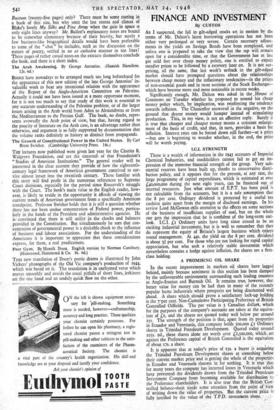FINANCE AND INVESTMENT
By CUSTOS
As I suspected, the fall in gilt-edged stocks set in motion by the terms of Mr. Dalton's latest borrowing operations has not been either very prolonged or very severe. Certain necessary adjust- ments in the yields on Savings Bonds have been completed, and unless one is prepared to take the view that the tap will remain open for a considerable time, or that the Government has at last got cold feet over cheap money policy, one is entitled to expect steadier prices to be followed by a recovery later on. It is not sur- prising, all the same, that last week's setback in the gilt-edged market should have prompted questions about the relationships between cheap money and the inflationary tendencies—in the prices of non-essential goods and in most sections of the Stock Exchange— which have become more and more noticeable in recent weeks.
Significantly enough, Mr. Dalton was asked in the ,House of Commons on Tuesday whether he proposed to amend his cheap money policy which, by implication, was reinforcing the tendency towards inflation. The Chancellor answered in the negative, on the ground that dearer money would hamper instead of stimulating production. This, in my view, is not an effective reply. Surely it is true that cheaper and cheaper money means a constant enlarge- ment of the basis of credit, and that, in turn, provides a basis for inflation. Interest rates can be forced down still further—at a price —but one is beginning to wonder whether, in the end, the price will be worth paying.
I.C.I. STRENGTH
There is a wealth of information in the 1945 accounts of Imperial Chemical Industries, and stockholders cannot fail to get an im- pression of the immense financial strength of the group. Very sub- stantial reserves have been built up, thanks to conservative distri- bution policy, and it appears that for the present, at any rate, the large programme of capital expenditure, which is estimated at over £40,000,00o during the next eight years, can be financed out .of internal resources. Just what amount of E.P.T. has been paid is not calculable from the accounts, but it is a safe assumption that the 8 per cent. Ordinary dividend is protected by a useful tax cushion quite apart from the margin of disclosed earnings. In his review Lord McGowan calls attention to the effects on some sections of the business of insufficient supplies of coal, but on the whole one gets the impression that he is confident of the long-term out- look. I.C.I. £1 Ordinary units have long since ceased to be an exciting industrial investment, but it is well to remember that they do represent the equity of Britain's largest business which enjoys sound management. At 44s. the yield on the 8 per cent. dividend is about 3 per cent. For those who are not looking for rapid capital appreciation, but who seek a relatively stable investment which nevertheless contains a hedge against inflation, the shares are a first- class holding.
A PROMISING OIL SHARE
In the recent improvement in markets oil shares have lagged behind, mainly because sentiment in this section has been damped by the unfavourable environment surrounding such leading counters as Anglo-Iranian and Burmah Oil. It remains true, however, that better value for money can be had than in many of the recently popular home industrials where prospects are being discounted well ahead. A share which should prove a satisfactory lock-up holding is the 7-per cent. Non-Cumulative Participating Preference of British Controlled Oilfields. The par value is 5 Canadian dollars, which for the purposes of the company's accounts are taken at the equiva- lent of £r, and the shares are quoted today well below par around r5s. The strength of the position is that, apart from its properties in Ecuador and Venezuela, this company holds 5oo,000 £r Ordinary shares in Trinidad Petroleum Development. Quoted today around 103s. 9d., these shares alone are worth over £2,5oo,00o, which .set against the Preference capital of British Controlled is the equivalent of about 17s. a share. It is apparent that at today's price of 15s. a buyer is acquiring the Trinidad Petroleum Development shares at something below their current market price and is getting the whole of the propenies
in Ecuador and Venezuela thrown in for nothing. It is true that for many years the company has incurred losses in Venezuela which have prevented the dividends drawn from the Trinidad Petroleum
Investment Company from becoming available for distribution IJ the Preference shareholders. It is also true that the British Con- trolled balance-sheet needs some attention from the point of vie% of writing down the value of properties. But the current price is fully justified by the value. of the T.P.D. investment alone.


























 Previous page
Previous page